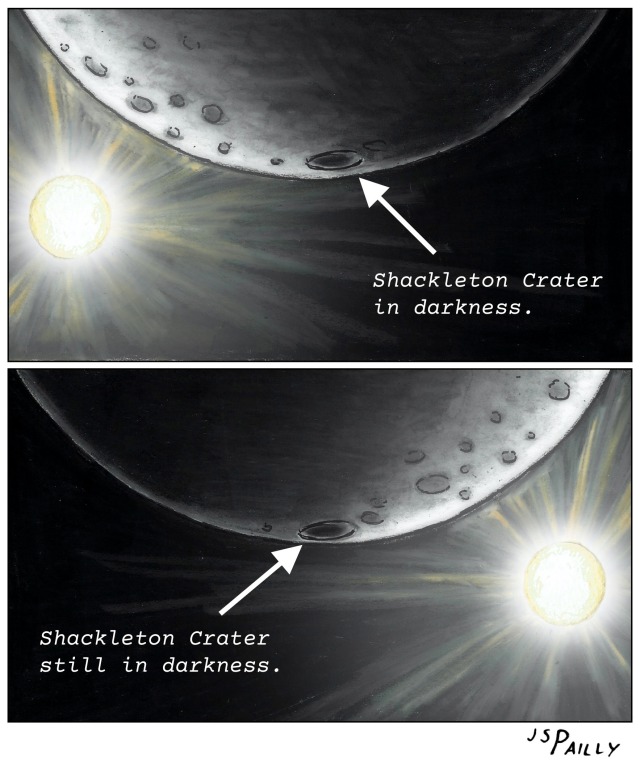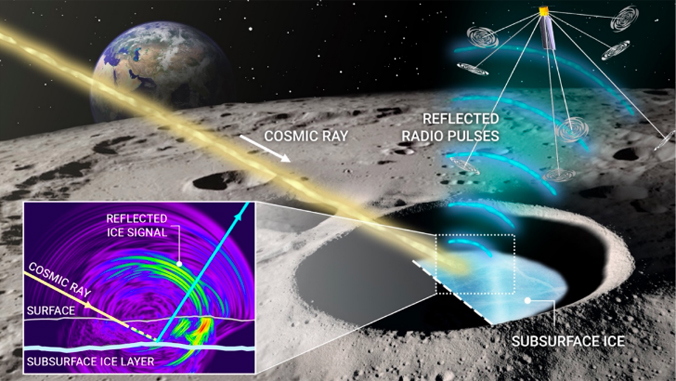New Mars Forums
You are not logged in.
- Topics: Active | Unanswered
Announcement
#26 2022-11-20 10:46:22
- tahanson43206
- Moderator
- Registered: 2018-04-27
- Posts: 23,681
Re: Propellant Sourced from Moon
For SpaceNut re #25
Thank you for your additional comments about the suggestion to use towers to direct photons from the poles (where light is always available) to the surface of the Moon away from the poles.
We have enough words on the board, at this point.
It is time for a member with skills in trigonometry ** and ** rendering of images for display on the forum.
We have members who can do trigonometry.
We have members who can display images on the forum, using imgur.com and other host sites.
What we do NOT seem to have at this point, are members who can perform both operations.
One way around that is for a member who can do trigonometry to publish figures, and for a member who can do images to do that.
We have plenty of words available to study ... let's produce something that could be published in a location away from the forum.
***
The cost of cables or light pipes is greater than zero.
A business that would set up shop on the Moon has to be careful with budget allocations.
The cost of shipping photons using mirrors is zero for infrastructure between sending point and receiving point.
It will be difficult for any proposal to beat a cost of zero, but our members are creative and may well come up with something.
(th)
Offline
Like button can go here
#27 2022-11-20 13:17:12
- SpaceNut
- Administrator
- From: New Hampshire
- Registered: 2004-07-22
- Posts: 30,065
Re: Propellant Sourced from Moon
Trig does not solve the problem engineering solutions will such as a periscope style design where the tangent point on the surface for the beam to be reflected must clear at the midpoint of the distance from the pole to the equator. Which has 45' mirror setting at both ends relative to the beam redirect.
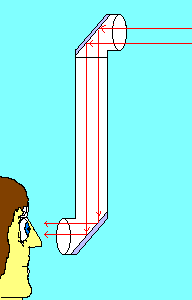
To control the mirror size, you might use a parabolic reflect to make the beam smaller for transmission between the end mirrors.
https://en.wikipedia.org/wiki/Shackleton_(crater)
Some sites along Shackleton's rim receive almost constant illumination.
Shackleton Crater's Illuminated Rim & Shadowed Interior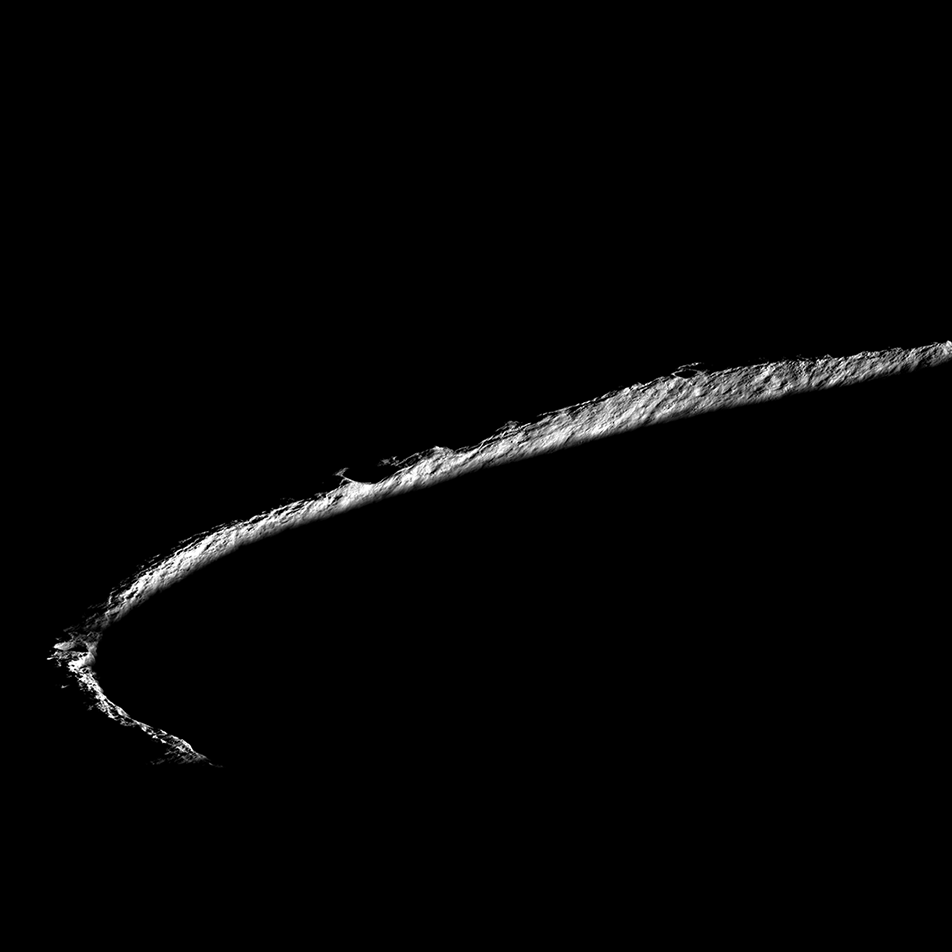
Which means any structure will block the light that would pass to the opposite side of the rim.
Detailed Characterization of Shackleton Crater
the dots represent where light hits unobstructed is in one of the images
side that has color is in the light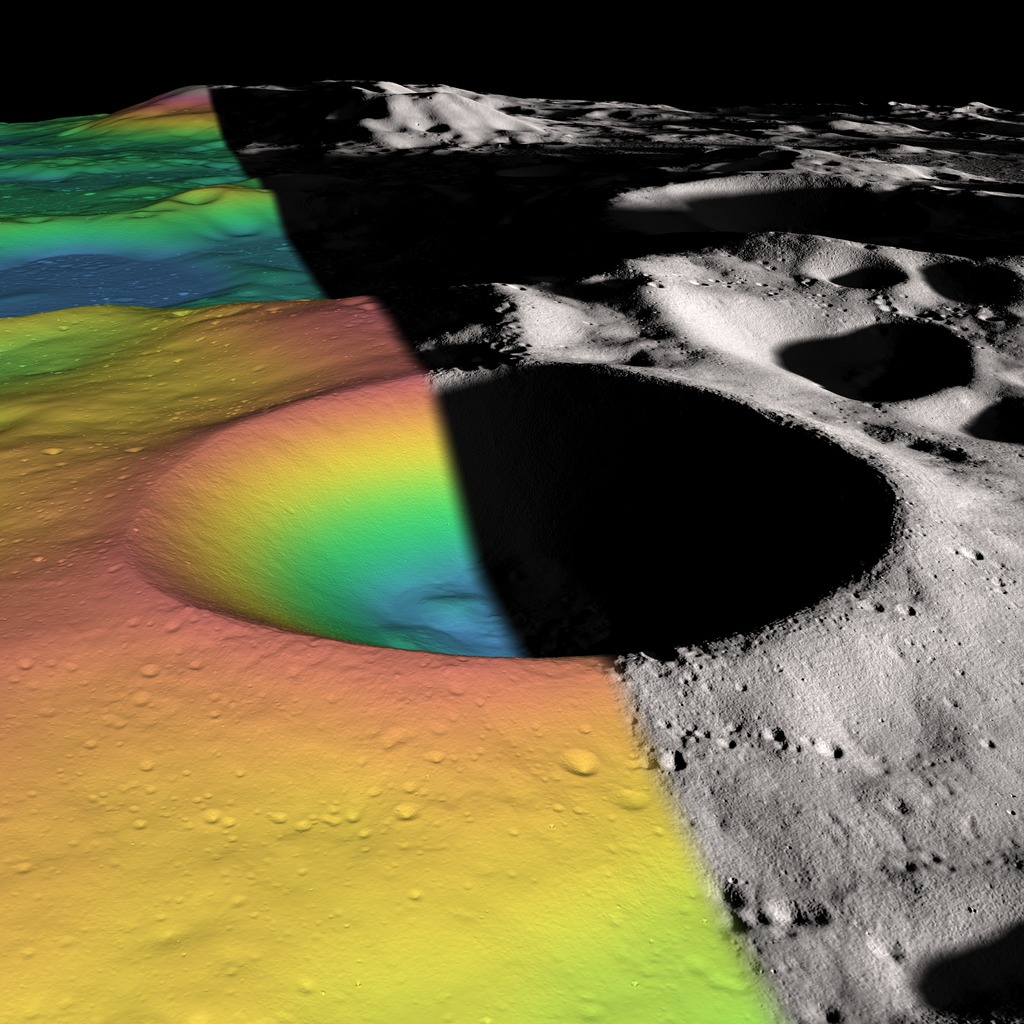
Area where ice is present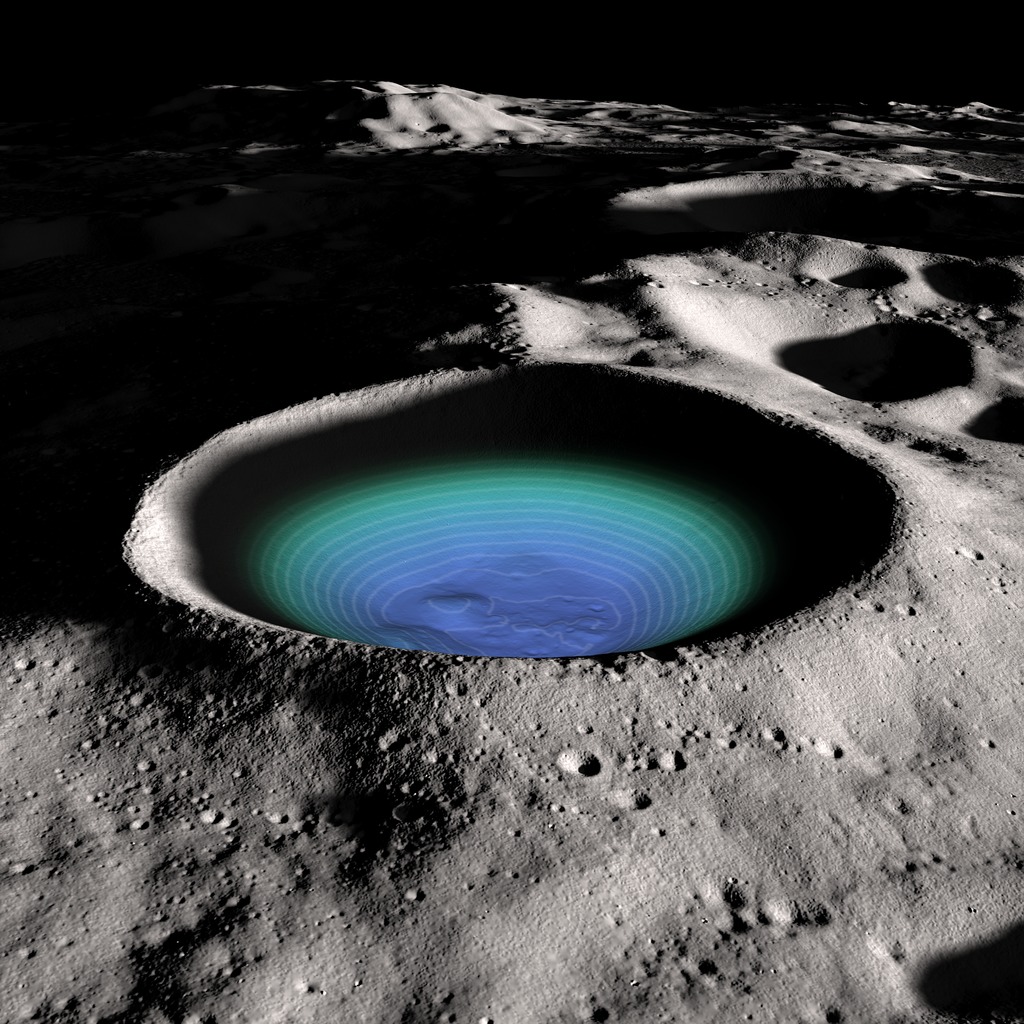
Illumination Map of the Moon's South Pole
Offline
Like button can go here
#28 2022-11-20 14:04:19
- tahanson43206
- Moderator
- Registered: 2018-04-27
- Posts: 23,681
Re: Propellant Sourced from Moon
For SpaceNut ....
Hopefully a member will come along to help with the trigonometry problem.
I note that the problem is made more difficult by the curvature of the surface of the Moon.
The solution (when it is presented) will show with diagrams and numbers, how light will move from the poles to the surface of the Moon away from the poles.
I'm looking forward to seeing the results.
(th)
Offline
Like button can go here
#29 2022-11-20 14:56:26
- SpaceNut
- Administrator
- From: New Hampshire
- Registered: 2004-07-22
- Posts: 30,065
Re: Propellant Sourced from Moon
The issue is that a site on the equator is stationary and does not move so sending energy collected from the poles is not viable if it is in the form of light energy. It will only work if supplied by a fiber conduit to bring it there. Otherwise, you need to convert it to electrical with a cable to the site to make use of while it's in the shadow.
Of the 13 sites on the moon that NASA has chosen for the ability to make use of solar lighting which is 6.5 days not at the poles.
Offline
Like button can go here
#30 2022-11-20 18:44:19
- tahanson43206
- Moderator
- Registered: 2018-04-27
- Posts: 23,681
Re: Propellant Sourced from Moon
For SpaceNut re #29
Would you be willing to develop your ideas a bit? They certainly sound interesting!
I would have thought that having a receiving site fixed would be advantageous. The transmitting tower at one of the poles would simply rotate to keep the output beam fixed on the receiver, as the Moon proceeds in it's circuit around the Earth. The Sun would appear to move around the horizon, but the tower would rotate so that reflected light would always flow to the fixed receiving tower.
There would be no need for an expensive cable.
There would be no need for expensive fiber pipe.
The photons would simply bounce from the tower at the pole to the receiving device at the speed of light, at no charge.
The light from the pole would be continuous. There would be NO day-night cycle in this system.
Why are we continuing to suppose there would be a day-night cycle.
Why are we continuing to want to use cable or fiber or some other physical conduit?
I'm probably just missing something important.
(th)
Offline
Like button can go here
#31 2022-11-20 19:04:34
- tahanson43206
- Moderator
- Registered: 2018-04-27
- Posts: 23,681
Re: Propellant Sourced from Moon
For all who might be interested in the idea of Grypd ...

This image came from a math site, which was offering information about how to inscribe a circle inside a hexagon.
If we understand the circle is the Moon, then we can visualize the photon flow from the poles to the receiving stations around the Moon.
I chose hexagon as just an example. The actual power deliver network could be a polygon with many more sides.
What I'm looking for here is the height of the towers needed to reflect sunlight to receiving points around the Moon.
There is NO need for cables.
There is NO need for fiber.
Photons travel through the vacuum for free.
(th)
Offline
Like button can go here
#32 2022-11-20 19:17:22
- SpaceNut
- Administrator
- From: New Hampshire
- Registered: 2004-07-22
- Posts: 30,065
Re: Propellant Sourced from Moon
Try this as the poles need a tower to aid in the passing of energy to the equator where the pole is at N and F locations the cords pass through the moon currently so the midpoint on the cord to the surface means you now have the height of the tower required for the moon's curvature.
The pole is rotating on a 28-day cycle and while I can simulate via a rotating unit to a focus point at the pole that would appear to be stationary for the receiver at that location for use.
You cannot send it to a non-moving location on the equator without a means to send it. Remember that reflection is with equal and opposite angles of reception.
The equatorial diameter of the Moon is 3,476.28 km. And the polar diameter of the Moon is 3,471.94 km. In other words, the Moon’s diameter from side to side is 4.34 km more than its distance from pole to pole.
https://moon.nasa.gov/inside-and-out/overview/
https://moon.nasa.gov/news/185/what-you … r-eclipse/
Offline
Like button can go here
#33 2022-11-20 19:46:12
- SpaceNut
- Administrator
- From: New Hampshire
- Registered: 2004-07-22
- Posts: 30,065
Re: Propellant Sourced from Moon
The right angle is the center of rotation, and it is not fixed as the moon rotates around every approximate 28 days on it as it makes its way around the earth. Every 6.5 days the rotation has turned a quarter of its spin.
The shackelton crater is 21 km (13 miles) in diameter to the rim which is due to axial tilt allows for the light to hit the sun facing sides along the rim where not blocked.
Three points on the crater’s rim remain collectively sunlit for more than 90% of the year due to this tilt.
this is the axis end view topography for frame A of the pole which is in the center of the crater
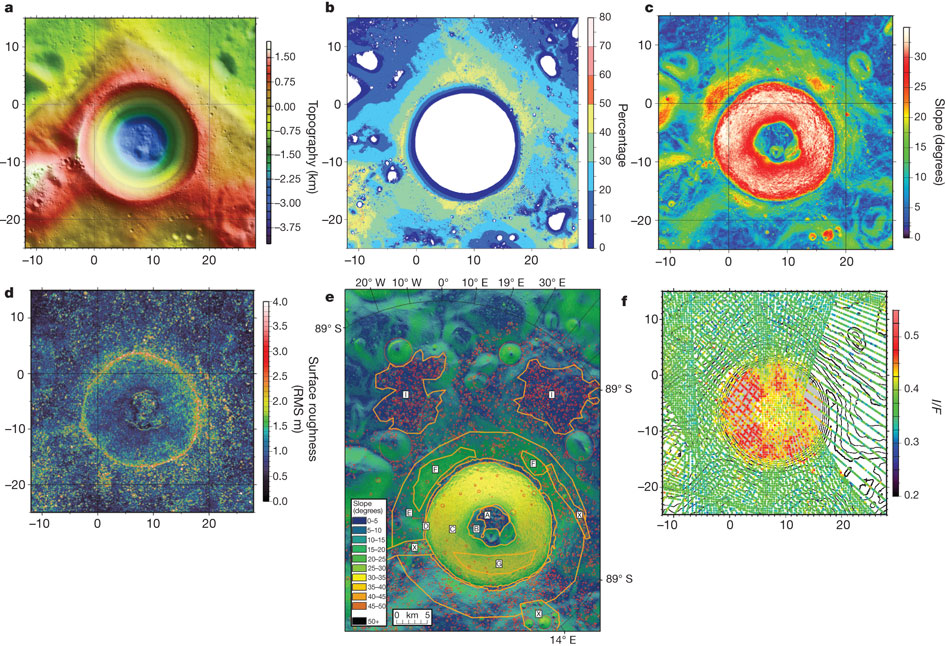
https://www.hou.usra.edu/meetings/lpsc2020/pdf/1148.pdf
TWO TYPES OF TERRAIN EXPOSED IN THE UPPER CRATER WALL OF SHACKLETON CRATER, LUNAR SOUTH POLE: IMPLICATIONS FOR FUTURE LANDINGS
https://www.lpi.usra.edu/announcements/ … s/2042.pdf
Artemis III EVA Opportunities along a Ridge Extending from Shackleton Crater towards de Gerlache Crater
Offline
Like button can go here
#34 2022-11-20 20:34:27
- tahanson43206
- Moderator
- Registered: 2018-04-27
- Posts: 23,681
Re: Propellant Sourced from Moon
For SpaceNut ...
In Post #31. I showed a diagram of the Moon with towers on the outside, and photons flowing through vacuum from one station to the next.
In Post #32, you showed a diagram with the chords inside the Moon.
Photons cannot flow ** through ** the Moon.
Was there a reason you chose the diagram with chords inside the Moon?
I'm probably missing something important.
***
What is needed is computation of the height of the towers that Grypd wrote about.
The diameter of the Moon given in your post is:
The equatorial diameter of the Moon is 3,476.28 km. And the polar diameter of the Moon is 3,471.94 km. In other words, the Moon’s diameter from side to side is 4.34 km more than its distance from pole to pole.
The height of the towers will be determined by computing the length of the side of the triangle of which the cord is the base, and subtracting the radius of the Moon.
We are slowly getting closer to seeing the answer in glowing pixels on our screens.
(th)
Offline
Like button can go here
#35 2022-11-20 20:52:25
- tahanson43206
- Moderator
- Registered: 2018-04-27
- Posts: 23,681
Re: Propellant Sourced from Moon
For SpaceNut .... following your lead, I found a hexagon calculator and asked it to compute the specific numbers for the Moon case ...
https://www.omnicalculator.com/math/hexagon
it came back with these results, when I gave it the radius of the Moon from your quote above ...
2007 kilometers is the radius of the hexagon, given the inner Moon radius of 1738 kilometers.
That means the towers of Grypd would be 2007 less 1738 or 269 kilometers tall.
The towers could be shorter if there were more sides to the polygon.
My guess is that it might be possible to build a tower of that height on the Moon, using iron/steel, but I'll bet that your recommended alternative of running a cable might look attractive to a builder.
SearchTerm:Tower for reflective mirrors on Moon per Grypd
SearchTerm:Grypd computation of height of tower for hexagonal photon delivery system for Moon
(th)
Offline
Like button can go here
#36 2022-11-20 20:57:26
- SpaceNut
- Administrator
- From: New Hampshire
- Registered: 2004-07-22
- Posts: 30,065
Re: Propellant Sourced from Moon
I did 2 bounce points to lower the height of the towers to something reasonable since the diameter of the shackelton crater is 21 km (13 miles) in diameter to the rim for the towers external walls to go vertical from for stationary target to send to the equations target. Making it a simpler pole on axis but even that is a deep crater to add that additional height for how high it's going to be; Or making more bounces will also make the tower height less as well.
The point is light follows a straight line and does not bend even on reflection and while I can redirect light to a different receiver location it's at that point that is got to be converted as we cannot make it go elsewhere without a more complex second reflector inside at the base of the tower as the tower is reflective on the inside surfaces.
The cords are tangent to the surface and end at each tower location so what we need is the height of the circle at the midpoint of the cords M to N or M to G since they are all equal. That gives the height of the tower above the pole minimum which is required to reflect the light between towers.
This a good reason to do microwave transmission between the towers rather than light as we can redirect that regardless of where the receiver points as they are separate units.
edit found the octagon from your site to see how high the tower will need to be
Offline
Like button can go here
#37 2022-11-20 21:21:43
- tahanson43206
- Moderator
- Registered: 2018-04-27
- Posts: 23,681
Re: Propellant Sourced from Moon
For SpaceNut re #36
It's good to see you engaged with Grypd's idea, and making progress in considering the options.
The midway point for power delivery can forward photons by reflecting them at 45 degrees up to a forwarding mirror which is also set at 45 degrees.
There is no need to waste energy converting photons of light to radio waves.
If Void were here with his drawing skills, he could quickly show you how to arrange the mirrors.
Diffraction of simple (non-laser) light is definitely a problem.
You've already recognized that in earlier posts.
Mirrors shaped as parabolas might be a solution, to refocus the light after a flight of many hundreds of kilometers.
(th)
Offline
Like button can go here
#38 2022-11-20 21:34:37
- SpaceNut
- Administrator
- From: New Hampshire
- Registered: 2004-07-22
- Posts: 30,065
Re: Propellant Sourced from Moon
sure, but the light will only reflect from a fixed mirror for a period that corresponds to 14 days of rotation or 180 degrees of which the center 6.5 days will be the strongest. At the ends of that will be nothing.
It's also only 45' degree if the height of the tower is as tall as you quoted 269 km.
Since we have never built anything that tall it's not something that is achievable.
Offline
Like button can go here
#39 2022-11-20 22:07:33
- kbd512
- Administrator
- Registered: 2015-01-02
- Posts: 8,379
Re: Propellant Sourced from Moon
Why put the mirrors on the surface if they can be in orbit? That way you only have to reach lunar orbit. There's even less gravity to deal with in orbit. It also takes a lot less propellant to come back to Earth from lunar orbit than it does from the surface of the moon. Maybe that doesn't satisfy someone's complexity cravings, but assuming the goal is to actually get the job done, then that's the easiest way to "ship photons around the moon".
Offline
Like button can go here
#40 2022-11-20 22:34:53
- SpaceNut
- Administrator
- From: New Hampshire
- Registered: 2004-07-22
- Posts: 30,065
Re: Propellant Sourced from Moon
An orbiting speed at the poles and at the equator to be synchronized in the same plane is that even possible since diameter changes speed and that means its cover more of an orbit to stay over it.
Offline
Like button can go here
#41 2022-11-20 22:45:06
- kbd512
- Administrator
- Registered: 2015-01-02
- Posts: 8,379
Re: Propellant Sourced from Moon
SpaceNut,
You need multiple mirror satellites if that's what you're getting at.
Offline
Like button can go here
#42 2022-11-20 22:51:03
- tahanson43206
- Moderator
- Registered: 2018-04-27
- Posts: 23,681
Re: Propellant Sourced from Moon
For SpaceNut re #38
As a reminder, the premise of Grypd's opening post was the proposition that tall towers ** could ** be built on the Moon, because (a) it has a vacuum and (b) it has 1/6th Earth gravity.
however, it is not necessary to build to 269 kilometers. A 1 kilometer tower should be quite practical on the Moon, and it can be built with light materials because the mirrors it will carry can be light weight.
I'll attempt to find a polygon calculator able to show how far apart the towers would have to be set.
The trades are between a network of towers supporting mirrors, and a run of cable on the lunar surface.
I'll bet on the towers for funding.
***
For kbd512 .... orbiting mirrors are a branch from the opening post of Grypd, who started with towers.
Orbiting mirrors may well be possible and perhaps even desirable, but that is not what Grypd suggested.
Since this topic is about making propellant, there is no reason (that I can see) why you couldn't pursue the orbiting mirror idea.
If I were building a set of plants on the Moon, and I were interested in Grypd's towers, I could (presumably) be assured of stable power supply as long as the Sun shines. If I were depending upon mirrors, I'd be investing in equipment to track the mirrors, and I'd have to save power in batteries for those frequent moments when there is no mirror satellite overhead.
(th)
Offline
Like button can go here
#43 2022-11-20 23:06:14
- tahanson43206
- Moderator
- Registered: 2018-04-27
- Posts: 23,681
Re: Propellant Sourced from Moon
For SpaceNut ...
https://www.calculatorsoup.com/calculat … olygon.php
Polygon Calculator
Choose a Regular Polygon(n > 14) Other
Enter Polygon n =
1000 <<== entered 1000 as the number of sidesChoose a Calculation
Find a, r, A, P | Given circumradius R
R =
1739 << == radius of Moon plus 1 kilometer
Let pi π =
3.1415926535898
Units
m
Significant Figures
6
Answer:
n n = 1000 sides
side length a = 10.9264 m <<== distance between towers is 11 kilometers
inradius r = 1738.99 m <<-- This is an indication the line of sight would be well above the surface of the Moon
circumradius R = 1739 m <<== radius of Moon plus height of 1 kilometer tower
area A = 9500490 m2
perimeter P = 10926.4 m
interior angle x = 179.64 °
exterior angle y = 0.36 °
The result above suggests that towers could be shorter if you have a lot of them.
It is still desirable to keep the photon beams well above the terrain.
(th)
Offline
Like button can go here
#44 2022-11-21 03:05:22
- kbd512
- Administrator
- Registered: 2015-01-02
- Posts: 8,379
Re: Propellant Sourced from Moon
tahanson43206,
While I may never understand the obsession with batteries, photonic energy can also be stored as heat energy, using molten metal or salt or in regolith. This eliminates the need for low energy density batteries that must be made on Earth and then transported all the way to the lunar surface. The overall energy input-to-output ratio is no better or worse than photovoltaics or batteries, except that regolith is free if you have a shovel.
By not dictating the immediate direct conversion of photons into electricity that must be consumed or stored, the energy you can extract per unit area is about 90% of the input power via mirrors, vs 25% to 35% with photovoltaic cells. You can get about half of that back out using sCO2 turbines, or up to 65% with combined heat and power. Since it's not electronic and doesn't need batteries, it's also not subject to any EM storm activity from the Sun. Your surface power conversion equipment size is then measured in square meters instead of square kilometers.
How many 1km high structures have we built on any planetary body?
Here on Earth we've built precisely zero 1km tall buildings, although the Kingdom Tower may eventually be completed. We could technically do it, but nobody can justify the construction cost and limited utility of such buildings. Burj Khalifa, the closest to 1km, cost 4.1 billion dollars to construct. SLS has already cost American tax payers considerably more than that. The Kingdom Tower, Buj Khalifa, and SLS are all vanity projects. If money doesn't matter and you're using someone else's, then anything's possible.
The KVLY-TV Mast is 628m in height and weighs 392t. The actual radio antenna portion weighs 4.1t, and the rest is support structure. The moon is 1/6g, so 65t for equivalent strength? There's obviously no wind at all on the moon, so perhaps it could be a bit lighter than that since there are no aero loads to contend with, but it's also less than 3/4 of the height of these "relay mirrors".
You don't have to build very many of those 1km high towers before you've grossly exceeded the mass of a nuclear reactor that doesn't care about the time of day, position of the Sun, or much of anything else except the ability to reject waste heat, and that's before the rest of the solar equipment is taken into consideration.
Is there a pressing need to build 1km high "photon repeater" towers on the moon?
Would a 1km long power cable 10 meters above the suffice?
Those are a lot easier to build.
The bottom line is that when you need hundreds of megawatts of 24/7/365 power output, you skip over the solar concepts and move on to things with energy densities measured in multiple megawatts per cubic meter.
Offline
Like button can go here
#45 2022-11-21 08:41:48
- tahanson43206
- Moderator
- Registered: 2018-04-27
- Posts: 23,681
Re: Propellant Sourced from Moon
For Grypd ....
The members of the forum have made an investment in your concept...
Please return to evaluate the responses, and (in particular) please take up the questions posed by kbd512 in Post #44
Thank you for your visit on Sunday! It tells me you are staying in touch with the forum.
It is now time for you to return to the topic and let us know what you think about work done to date.
(th)
Offline
Like button can go here
#46 2022-11-21 09:13:28
- SpaceNut
- Administrator
- From: New Hampshire
- Registered: 2004-07-22
- Posts: 30,065
Re: Propellant Sourced from Moon
If it's to make fuel then you only need the power where there is ice to be had and so far, that is only in a select few locations on the moon as its only in the bottom of craters that stay dark all of the time like Shakelton.
That said all of this topic does not require anything other than a few hundred feet of building at each of the peaks that I posted about at the poles and mirrors to redirect that light for use.
Could we be doing the molten salt sure we can but then we must move it to isolated storage after its created and then to the turbine system to create the power that we require.
It was 2009 when we got the ice data 
updated in 2018
https://www.nasa.gov/feature/ames/ice-c … on-s-poles
Offline
Like button can go here
#47 2022-11-21 10:14:43
- Void
- Member
- Registered: 2011-12-29
- Posts: 9,120
Re: Propellant Sourced from Moon
I do not wish to have a large footprint in this topic. But I am interested in it. I came upon a very interesting material, which I will use over where I am more active, but perhaps it could help here as well: https://moon.nasa.gov/inside-and-out/water-on-the-moon/
Done.
Is it possible that the root of political science claims is to produce white collar jobs for people who paid for an education and do not want a real job?
Offline
Like button can go here
#48 2024-12-11 11:34:25
- tahanson43206
- Moderator
- Registered: 2018-04-27
- Posts: 23,681
Re: Propellant Sourced from Moon
In a recent post in another topic related to the Moon, it was suggested that liquid oxygen and properly prepared aluminum powder might serve as a useful propellant. This topic may well contain discussion of this propellant choice. In any case, the topic is a good place for a refresh on the subject.
Since both atom types are available on the Moon, and there is plenty of Solar energy available, it makes sense to consider this propellant combination.
However, the materials may be difficult to work with, so I'm hoping NewMars members who have a bit of time and for whom the question is interesting, will report on such details as:
1) ISP of this propellant combination
2) Ease of handling - how are the materials carried in a rocket for use?
3) Does this propellant combination wear out rocket nozzles faster than other propellants?
4) Does use of this propellant combination lead to caking inside a combustion chamber?
6) Is there a solid form that allows for greater convenience in packaging and use?
There may be a Wikipedia article that covers this ... a link here would be welcome.
(th)
Offline
Like button can go here
#49 2024-12-11 17:57:12
- Void
- Member
- Registered: 2011-12-29
- Posts: 9,120
Re: Propellant Sourced from Moon
Aluminum is a highly reactive metal like Sodium. The only reason we can use it in construction is that when exposed to atmosphere, it quickly develops a protective Oxide coating which does not burn.
Aluminum will burn in water, if it is prepared correctly, it seems. Alice Rocket: https://en.wikipedia.org/wiki/ALICE_%28propellant%29 You might want to read that. Quote:
Aluminum-Ice Rocket Propellant, or ALICE, is a rocket propellant that consists of nano-aluminum powder and water. After mixing, the material is frozen to keep it stable.
But it is my opinion that we do not want to waste water on the Moon as propellant if we have a substitute.
Apparently a Liquid Oxygen paste with Aluminum powder mixed in is somewhat stable, when cold. I am not sure if the Aluminum powder needs a thin Oxide coating to keep the mix stable or not. Probably yes, I would guess.
Here is what I think you requested, (th): https://space.stackexchange.com/questio … ant-source
The technology is only partially tested.
In the first mention they say that they used Liquid Nitrogen to keep the burn from flashing back into the paste filled tank.
Nitrogen would be expensive on the Moon, so we would want to find another way. Also, for now I would not try using anything like this for a crewed mission, not until it's merits are proven.
I think that it would make sense to put a little water ice, or maybe Methane??? into the mix, as Hydrogen gas could improve the performance, I suspect.
As is the propulsion is not to be expected to be as good as our current liquid fueled rockets though.
Quote:
Aluminum and oxygen alone will provide a specific impulse somewhat lower than most hydrocarbons. Brower et al. expect a value of 285 seconds...
So, a bit weaker than for standard liquid fuels, but then the Moon's gravity is only 1/6th that of Earth, so it may be sufficient.
Ending Pending ![]()
Last edited by Void (2024-12-11 18:12:59)
Is it possible that the root of political science claims is to produce white collar jobs for people who paid for an education and do not want a real job?
Offline
Like button can go here
#50 2024-12-11 19:24:19
- tahanson43206
- Moderator
- Registered: 2018-04-27
- Posts: 23,681
Re: Propellant Sourced from Moon
For Void re #49
I found this NASA study from 1993 as I was preparing to follow the links you provided.
https://ntrs.nasa.gov/api/citations/199 … 017287.pdf
It reports on experiments performed in the lab, to evaluate aluminum and magnesium.
Results were not encouraging, and potential problems were not studied.
The link to Wikipedia you provided was more encouraging. An actual rocket appears to have been tested in 2009.
The combination of aluminum powder in water is frozen.
The reaction products are aluminum oxide and hydrogen which would presumably be lost. However, the Wikipedia article reports that the hydrogen contributes to the effectiveness of the propellant.
Thus, this particular propellant would not be fully reusable.
This link points to a study given for an AIAA conference: https://arc.aiaa.org/doi/abs/10.2514/6.2009-4877
The paper is available for $45.
I come away from this brief investigation with the impression that aluminum is definitely a candidate for propulsion from the Moon, but apparently it would not be the first choice of an engineer working the problem.
Since the system described in the Wikipedia article requires water, it seems reasonable to me to just use the water and forget the aluminum.
(th)
Offline
Like button can go here
